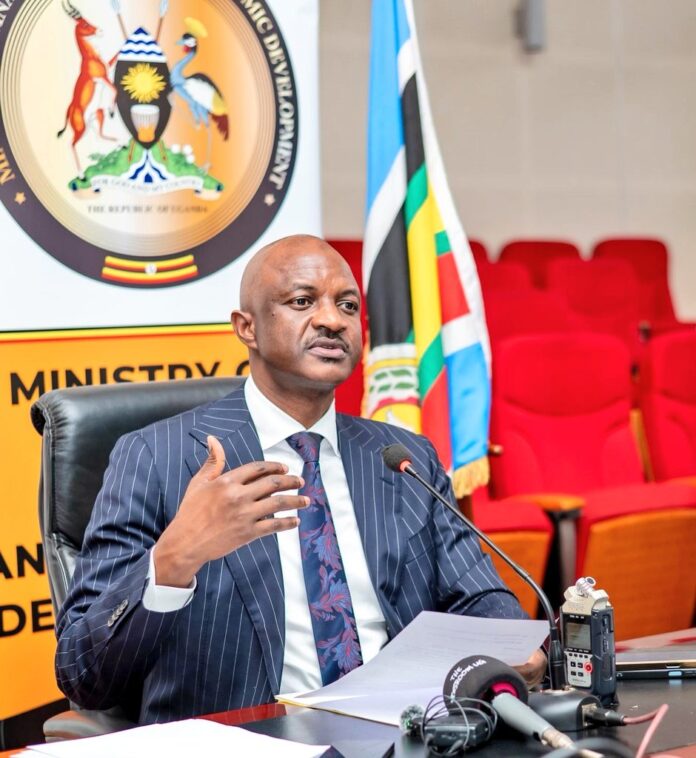Ministry of Finance, Planning and Economic Development has released Shs 17.18 trillion for the first quarter (July–September) of the Financial Year 2025/26, representing 23.7% of the approved national budget. The announcement was made on Tuesday during a press briefing by Ramathan Ggoobi, the Permanent Secretary and Secretary to the Treasury.
The Q1 release follows the approval of a Shs 72.38 trillion national budget aimed at supporting Uganda’s Ten-Fold Growth Strategy, with significant focus on Agro-industrialization, Tourism, Mineral development, and Science, Technology and Innovation (ATMS), along with the security and infrastructure sectors.
Economic Resilience and Growth Outlook
Ggoobi highlighted Uganda’s continued economic resilience, with real GDP growth averaging 6.9% in the last financial year and projected to reach 7% in FY 2025/26. In nominal terms, the economy expanded to Shs 226.34 trillion (USD 61.3 billion), up from Shs 203.71 trillion in FY 2023/24.Inflation remains within the Bank of Uganda’s 5% target, standing at 3.9% in June 2025. Meanwhile, the Uganda Shilling appreciated by 1.3% against the US dollar during the same month, attributed to increased exports, remittances, and offshore investments.
Export Surge and Reduced Trade Deficit
Uganda’s export earnings grew significantly, with Q3 FY 2024/25 exports reaching USD 2.6 billion — a 39.1% increase from the previous year. This was driven by higher volumes and global prices of commodities like coffee and cocoa. The trade deficit narrowed to USD 461.15 million, down from USD 757.48 million the previous year.
Foreign direct investment rose to USD 785.79 million in Q3, marking a 26.3% increase, while remittances surged to USD 304.48 million. International reserves improved to USD 4.3 billion, equivalent to 3.8 months of import cover.
Sectoral Allocation of Q1 Funds
The Q1 expenditure limits are divided among key sectors as follows:
Security: Shs 719.12 billion to Ministry of Defence; Shs 130.73 billion to Uganda Police; Shs 108.38 billion to State House.
Infrastructure: Shs 1.08 trillion to Ministry of Works and Transport, including Shs 942.90 billion for contractor payments. The Ministry of Energy received Shs 420.76 billion, and Kampala Capital City Authority was allocated Shs 148.32 billion.
Human Capital Development:
* Ministry of Health: Shs 262.88 billion
* Ministry of Education and Sports: Shs 143.75 billion
* Public Universities and institutions: Shs 157.73 billion
* National Medical Stores: Shs 173.96 billion
* Ministry of Gender, Labour and Social Development: Shs 118.23 billion
* Uganda Cancer and Heart Institutes: Shs 80.18 billion
* Referral hospitals: Shs 40.99 billion
* Local Governments: Shs 382.03 billion
ATMS Programmes:
* Agro-industrialization: Shs 215.28 billion
* Tourism: Shs 20.5 billion
* Minerals and Oil & Gas: Shs 26 billion
* Science and Innovation: Shs 139.13 billion, including Shs 33 billion for artists
Revenue Agencies: Uganda Revenue Authority (Shs 114.9 billion), URSB (Shs 9.71 billion), National Citizenship & Immigration (Shs 40.43 billion), and UNBS (Shs 26.44 billion).
Accountability Measures
Ggoobi urged Accounting Officers to prioritize timely payments to avoid arrears, ensure all contracts are executed in Ugandan Shillings, and refrain from unauthorized recruitments. He also emphasized the importance of convening Finance Committee meetings to align spending with approved budgets. “Our main objective is to promote technical efficiency by ensuring all government institutions deliver better services to Ugandans at the lowest cost,” said Ggoobi.



